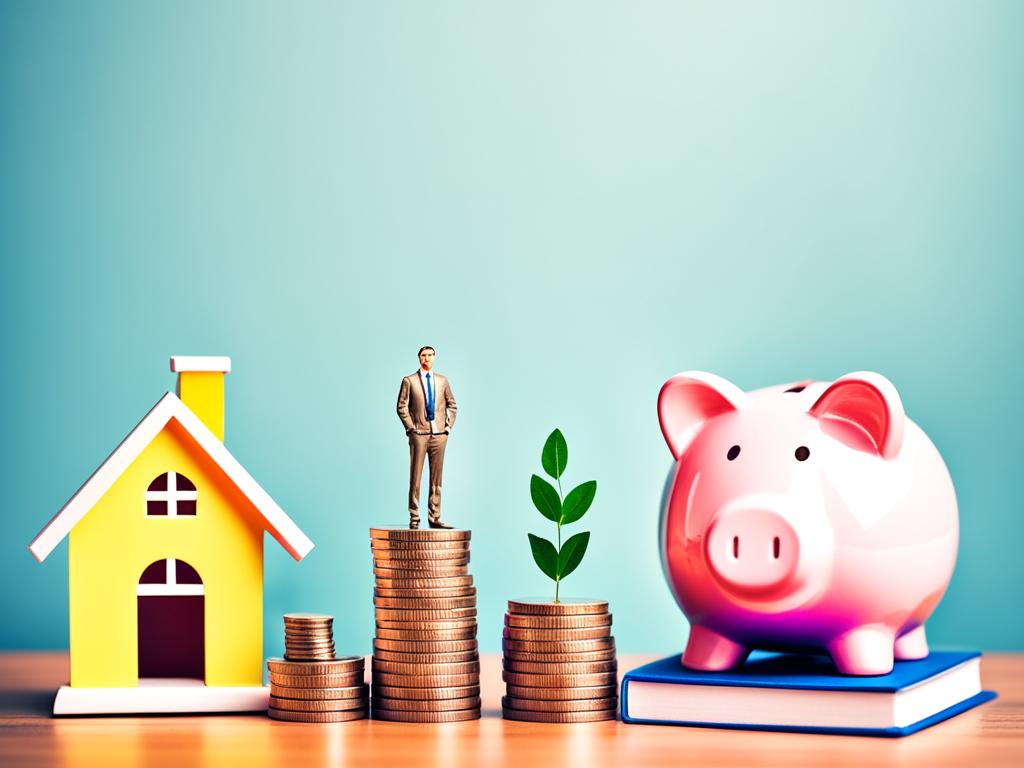
How to Move from Renting to Homeownership
Moving from renting to owning a home is both thrilling and a bit scary. But, with the right advice, you can make it through. This guide will cover the perks of owning a home, check if you’re ready financially, and guide you through buying a home. We aim to help you make smart choices and achieve your dream of homeownership.

If you’re a first-time home buyer or want to move up, this article has what you need. We’ll cover the benefits of homeownership, help you figure out your budget, and guide you through the home buying process. Get ready for an exciting journey towards home ownership and start building your financial future today.
Understanding the Benefits of Homeownership
Buying a home is a big step in your financial life. It brings many benefits that help your finances grow over time. Being a homeowner lets you build equity, which is a key asset for your wealth.
Building Equity and Wealth
Homeownership lets you build equity as you pay off your mortgage. Each payment you make adds to your ownership of the property. This equity can be used for loans, credit lines, or even for buying more property.
Homeownership: Tax Advantages
Homeownership comes with tax perks that can lower your costs. You can deduct mortgage interest and property taxes, saving you money on taxes. These benefits make owning a home a smart financial move.
Knowing the perks of homeownership, property investment, and tax advantages helps you decide if buying a home fits your financial plans and future security.

Homeownership: Assessing Your Financial Readiness
Before you start thinking about homeownership, make sure you’re financially ready. Look at your credit score, save for a down payment, and check your financial health. This includes your income, debts, and expenses. Knowing your finances will show if you can handle the duties of mortgage and home loans.
First, check your credit score. This number shows how good you are with credit and affects your mortgage rates. Try to get a score of 620 or higher for better home loans.
Then, start saving for a down payment. The more you put down, the better mortgage you can get and the less you’ll pay overall. Aim for 20% of the home’s price to skip private mortgage insurance (PMI) and get the best rates. If you’re buying your first home, look into programs that help with down payments.
Lastly, look at your whole financial picture. Think about your income, debts, and monthly expenses. This helps you figure out what you can afford and avoid spending too much in the housing market.

By checking your finances well, you’ll be ready for the home buying process. You’ll make a choice that fits your goals and keeps you financially strong.
Calculating Your Budget and Affordability
Figuring out your budget and what you can afford is key when buying a home. You must think about the upfront costs like the down payment and closing costs. Don’t forget about the monthly costs, like your mortgage payments, property taxes, and insurance. By looking at your finances closely, you can make smart choices during your home buying journey.
Homeownership: Down Payment and Closing Costs
The down payment is the first payment you make when buying a home. It usually is between 3% to 20% of the home’s price. You also need to think about closing costs, which are 2% to 5% of the home’s value. These costs include fees for loan origination, appraisal, title insurance, and more.
Mortgage Pre-Approval
Getting a mortgage pre-approval is important to know how much you can borrow. You share your financial info, like your income, assets, and credit history, with lenders. They then tell you the most you can borrow. A pre-approval letter also helps when you’re making an offer on a home.

By looking at both upfront and ongoing costs of owning a home, you can make a solid budget. This way, your home buying experience will be financially smart and rewarding.
Homeownership: Navigating the Home Buying Process
After you’re ready financially and have a budget, it’s time to start looking for a home. This part of buying a home is key. You need to find a good real estate agent to help you with searching, negotiating, and closing the deal. They know the local housing market well and can show you homes that fit your needs and budget.
Working with Real Estate Agents
A good real estate agent is very important when buying a home. They know a lot about the market and can explain the details of different neighborhoods. They also help with the tricky parts of negotiating and paperwork. With an agent’s help, you can make sure buying a home goes smoothly and successfully.
Your agent will help you find the right property and set up viewings. They can also help you make strong offers, guide you through contracts, and work with lenders and other experts. With their help, you can make smart choices and feel sure about buying your new home.
FAQ
What are the key benefits of homeownership?
Homeownership helps you build equity and wealth over time. You also get tax benefits like deducting mortgage interest and property taxes.
How do I know if I’m financially ready to buy a home?
Check your credit score and save for a down payment. Look at your income, debts, and expenses too. Figuring out what you can afford is key.
What are the upfront costs associated with buying a home?
Upfront costs include the down payment, which can be 3% to 20% of the home’s price. Closing costs add up to 2-5% of the home’s value. Make sure to include these in your budget.
Why is it important to get pre-approved for a mortgage?
Getting pre-approved shows you know how much you can borrow. It sets realistic expectations for your search. It also shows sellers you’re a serious buyer, helping you stand out in a competitive market.
How can working with a real estate agent benefit me as a first-time homebuyer?
A real estate agent knows the local market well. They help find homes that fit your needs and budget. They guide you through buying, negotiating, and closing, making the process smoother and more informed.



This is nice 👍
I appreciate the encouragement to start small and prioritize needs over wants.